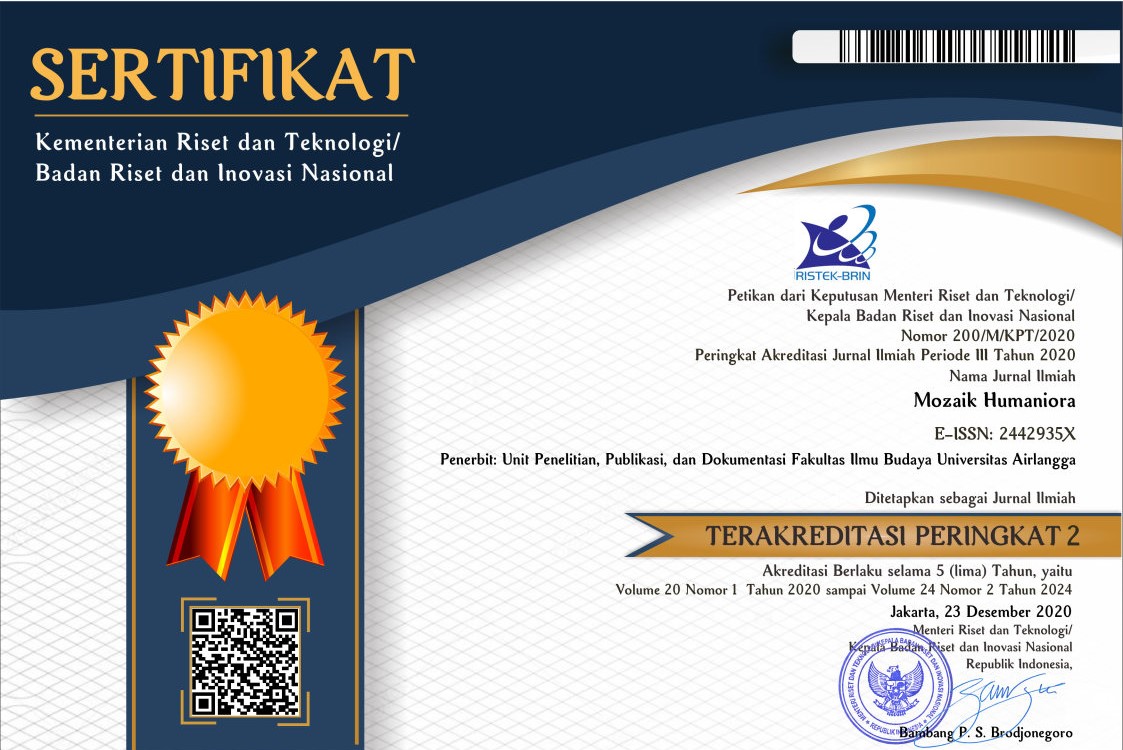Implikasi Sosialisasi Bahasa dan Perspektif Sosiokultural untuk Instruksi Literasi: Studi Kasus pada SD Negeri Jagir 2 Surabaya
Downloads
Abstrak
Siswa-siswa yang ada di sekolah umumnya berasal dari latar belakang budaya dan linguistik yang berbeda-beda. Banyak siswa yang datang ke sekolah dengan membawa tidak hanya bahasa yang baru tetapi juga budaya baru yang tidak sama dengan budaya sekolah pada umumnya. Perbedaan-perbedaan ini dapat membuat guru salah mengartikan atau meremehkan kemampuan siswa sehingga dapat menjadi penghambat dalam interaksi dan komunikasi antara guru dan siswa, serta dapat pula membuat guru memberikan instruksi literasi yang tidak dipahami oleh siswa karena perbedaan cara penggunaan bahasa. Metode penelitian yang digunakan adalah metode kualitatif dengan pendekatan etnografi. Teknik pengambilan data dilakukan dengan cara observasi partisipatoris dan wawancara. Pengamatan dilakukan selama dua minggu di SD Negeri Jagir 2 Surabaya. Dari hasil penelitian didapatkan simpulan bahwa guru seharusnya membangun interaksi komunikatif yang lebih relevan dengan budaya siswa dengan bentuk aktivitas literasi oral bersama guru dan teman sebaya pada kelas-kelas rendah seperti kelas satu dan kelas dua. Hal ini dapat dilaksanakan dengan banyak melibatkan siswa dalam kegiatan yang bersifat cooperative learning, yaitu kerja kelompok di mana siswa dapat menggunakan bahasa lokalnya, yaitu bahasa Jawa dengan sesama teman sebayanya untuk membantu mereka menguasai literasi dalam bahasa formal sekolah, yaitu bahasa Indonesia.
Kata kunci: literasi, siswa, sosialisasi bahasa
Abstract
Pupils in school generally come from different cultural and linguistic backgrounds. Many children going to school do not only bring a new language, but also a new culture which is not the same as their school culture in general. These differences can make teachers misunderstand or underestimate the children's ability as a student. This can hinder any interaction and communication between teachers and students; later, this can lead the teachers to give a literacy instruction that may not be understood by the students due to the difference of how the language is used. The present study applied a qualitative method with an ethnographic approach. Some participatory observations and interviews were conducted. The observations were conducted in two weeks in a public elementary school SD Negeri Jagir 2 Surabaya. The findings of the study show that the teacher should build more relevant communicative interactions which fit with the culture of the students in the forms of oral literacy activities. These activities involved the teachers and peers at the lower grades such as the first grade one and the second grade. In addition, the students could work in group work where they can use their local language.
Keywords: language socialization, literacy, pupils

Mozaik Humaniora is licensed under a Creative Commons Attribution-ShareAlike 4.0 International License. Both authors and Mozaik Humaniora agree with the following attribution of journal:
1. Copyright of this journal is possession of Author, by the knowledge of the Editorial Board and Journal Manager, while the moral right of the publication belongs to the author.
2. The journal allows the author(s) to retain publishing rights without restrictions
3. The legal formal aspect of journal publication accessibility refers to Creative Commons Attribution Share-Alike (CC BY-SA).
4. The Creative Commons Attribution Share-Alike (CC BY-SA) license allows re-distribution and re-use of a licensed work on the conditions that the creator is appropriately credited and that any derivative work is made available under "the same, similar or a compatible license”. Other than the conditions mentioned above, the editorial board is not responsible for copyright violation.


















